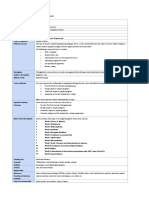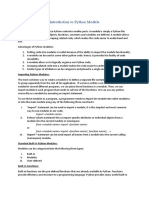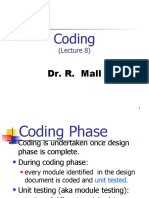0 ratings0% found this document useful (0 votes)
198 viewsIntro To Python Programming Course Layout
This course is part of a specialization on introduction to programming with Python and Java. The specialization consists of 4 courses that will each have 3-4 modules expected to take a week to complete. The course content includes lecture, code along exercise, and coding demonstration videos. It also includes readings, module resources like slides and data sets, 2 quizzes per module, and 1 programming assignment per module. Students can interact through discussion forums to ask questions or provide thoughts on the course content.
Uploaded by
عمار مصعب عادلCopyright
© © All Rights Reserved
Available Formats
Download as PDF, TXT or read online on Scribd
0 ratings0% found this document useful (0 votes)
198 viewsIntro To Python Programming Course Layout
This course is part of a specialization on introduction to programming with Python and Java. The specialization consists of 4 courses that will each have 3-4 modules expected to take a week to complete. The course content includes lecture, code along exercise, and coding demonstration videos. It also includes readings, module resources like slides and data sets, 2 quizzes per module, and 1 programming assignment per module. Students can interact through discussion forums to ask questions or provide thoughts on the course content.
Uploaded by
عمار مصعب عادلCopyright
© © All Rights Reserved
Available Formats
Download as PDF, TXT or read online on Scribd
You are on page 1/ 1
Introduction to Python Programming
Instructor : Brandon Krakowsky
Course Layout
This course is part of the specialization Introduction to Programming with Python and Java.
The specialization consists of 4 courses :
1. Introduction to Python Programming
2. Data Analysis using Python
3. Introduction to Java and Object-Oriented Programming
4. Inheritance and Data Structures in Java
Each of these courses will have 3-4 Modules of content. Typically, each module is expected to
take a week to complete, assuming a time commitment of around 5-6 hrs/week.
Course Content Overview:
● Videos:
In this course you will notice a few different types of videos :
○ Video : These are lecture videos. They may have the Instructor on screen, or
feature his voice over slides or code in order to teach a concept.
○ Code Along Exercise video : The Instructor uses these to lead students through
coding problem examples. Students are expected to follow along on their local
computer. Starter code files will be provided in the respective Module’s
resources.
○ Coding Demonstration video : The Instructor uses these to demonstrate how to
solve a sample coding problem. These videos are meant to show previously
taught concepts in practical application. Students are not expected to follow
along on their computer.
● Readings : Text-based instructional content, which sometimes include exercises and
examples for students to work on on their own.
● Module Resources: At the beginning of each module you will find Module Resources,
which include the slides that correspond to the lecture videos, as well as data sets and
coding files students can download while working on Code Along Exercises.
Assessment and Activities:
● 2 Quizzes per Module : T hese are short knowledge-check questions
● 1 assignment per Module: These are weekly programming assignments, which will be
auto-graded.
Student Interaction and Support:
● Discussion Forums - Students may post to discussion forums on a weekly basis with
any questions or thoughts on the course content. A special forum is provided for all
questions about Codio. Course Staff and other students will respond at their earliest
convenience.
You might also like
- CIT 316 Compiler Construction I March 24 2022100% (1)CIT 316 Compiler Construction I March 24 2022234 pages
- Data Analysis using Python_Course LayoutNo ratings yetData Analysis using Python_Course Layout1 page
- Programming With Python - Curriculum OverviewNo ratings yetProgramming With Python - Curriculum Overview20 pages
- EdX Programming & Datastructures SyllabusNo ratings yetEdX Programming & Datastructures Syllabus7 pages
- MBA (DS) - Introduction To Python Programming100% (1)MBA (DS) - Introduction To Python Programming144 pages
- k8egWZm1RuqHoFmZtfbq3Q - Introduction To Python Programming - SyllabusNo ratings yetk8egWZm1RuqHoFmZtfbq3Q - Introduction To Python Programming - Syllabus4 pages
- (eBook PDF) Introduction to Programming Using Python An 1 download100% (3)(eBook PDF) Introduction to Programming Using Python An 1 download45 pages
- (eBook PDF) Introduction to Programming Using Python An 1instant download100% (5)(eBook PDF) Introduction to Programming Using Python An 1instant download56 pages
- E-PG Pathshala Moocs: Pankaj Mittal Additional Secretary UGC Abhishek Kumar Scientist InflibnetNo ratings yetE-PG Pathshala Moocs: Pankaj Mittal Additional Secretary UGC Abhishek Kumar Scientist Inflibnet37 pages
- Python For Cybersecurity Professionals - Course SyllabusNo ratings yetPython For Cybersecurity Professionals - Course Syllabus3 pages
- Get (eBook PDF) Introduction to Programming Using Python An 1 free all chapters100% (7)Get (eBook PDF) Introduction to Programming Using Python An 1 free all chapters34 pages
- CSC412 Compiler Construction I March 24 2022 NOUN-pages-1No ratings yetCSC412 Compiler Construction I March 24 2022 NOUN-pages-148 pages
- Online and Blended Courses-RCS102-Object Oriented Programming 2022No ratings yetOnline and Blended Courses-RCS102-Object Oriented Programming 20222 pages
- Python Bootcamps Learn Python Programming and CoNo ratings yetPython Bootcamps Learn Python Programming and Co1 page
- (eBook PDF) Introduction to Programming Using Python An 1 2024 scribd download100% (2)(eBook PDF) Introduction to Programming Using Python An 1 2024 scribd download40 pages
- (eBook PDF) Introduction to Programming Using Python An 1 - Quickly download the ebook in PDF format for unlimited readingNo ratings yet(eBook PDF) Introduction to Programming Using Python An 1 - Quickly download the ebook in PDF format for unlimited reading55 pages
- Complete Download (eBook PDF) Introduction to Programming Using Python An 1 PDF All Chapters100% (5)Complete Download (eBook PDF) Introduction to Programming Using Python An 1 PDF All Chapters45 pages
- Edx Computer Science Fundamentals SyllabusNo ratings yetEdx Computer Science Fundamentals Syllabus6 pages
- Course Syllabus COSC 1436 - Programming Fundamentals INo ratings yetCourse Syllabus COSC 1436 - Programming Fundamentals I3 pages
- Data Science Somaliland 2024 IntroductionNo ratings yetData Science Somaliland 2024 Introduction18 pages
- 6) S.Y.B.B.A. (C.A.) - Sem - IV - Labbook - 2019 - Pattern - 08.07.2021100% (1)6) S.Y.B.B.A. (C.A.) - Sem - IV - Labbook - 2019 - Pattern - 08.07.2021150 pages
- DR Mark Hepple & DR Siobhan North: COM160 Basic Java Programming and Problem Solving Credits: 20 Academic Year 2014 15No ratings yetDR Mark Hepple & DR Siobhan North: COM160 Basic Java Programming and Problem Solving Credits: 20 Academic Year 2014 152 pages
- Artificial+Intelligence+With+Python+Nanodegree+Syllabus+9 5No ratings yetArtificial+Intelligence+With+Python+Nanodegree+Syllabus+9 514 pages
- Fatty Acid Metabolism and Its Regulation 1984No ratings yetFatty Acid Metabolism and Its Regulation 1984223 pages
- S. Kannadhasan (Editor), R. Nagarajan (Editor), Alagar Karthick (Editor) - Intelligent Technologies For Sensors - Applications, Design, and Optimization For A Smart World-ANo ratings yetS. Kannadhasan (Editor), R. Nagarajan (Editor), Alagar Karthick (Editor) - Intelligent Technologies For Sensors - Applications, Design, and Optimization For A Smart World-A404 pages
- Software Engineering Module III-I NotesNo ratings yetSoftware Engineering Module III-I Notes17 pages
- Papy: Parallel and Distributed Data-Processing Pipelines in PythonNo ratings yetPapy: Parallel and Distributed Data-Processing Pipelines in Python7 pages
- Files Quiz - Data Science Masters - PW SkillsNo ratings yetFiles Quiz - Data Science Masters - PW Skills3 pages
- Buy ebook Advanced topics in types and programming languages 1st Edition Benjamin C. Pierce cheap price100% (4)Buy ebook Advanced topics in types and programming languages 1st Edition Benjamin C. Pierce cheap price50 pages
- Prof. Dr.-Ing. Jürgen Gausemeier, Dipl.-Ing. Dirk Brexel, Dipl.-Ing. Thorsten Frank (auth.), Prof. Dr.-Ing. Joachim Lückel (eds.) - Proceedings of the Third Conference on Mechatronics and Robotics_ “FNo ratings yetProf. Dr.-Ing. Jürgen Gausemeier, Dipl.-Ing. Dirk Brexel, Dipl.-Ing. Thorsten Frank (auth.), Prof. Dr.-Ing. Joachim Lückel (eds.) - Proceedings of the Third Conference on Mechatronics and Robotics_ “F550 pages
- Data Science and Its Applications (21AD62) Lab ManualNo ratings yetData Science and Its Applications (21AD62) Lab Manual26 pages
- Toaz - Info Pipe Rack Design Philosophy Modular PRNo ratings yetToaz - Info Pipe Rack Design Philosophy Modular PR3 pages
- Long Term Hotel Management System Project (1)No ratings yetLong Term Hotel Management System Project (1)134 pages
- A Graph Based Approach For Module Library Development in - 2022 - Computers inNo ratings yetA Graph Based Approach For Module Library Development in - 2022 - Computers in13 pages




































































































